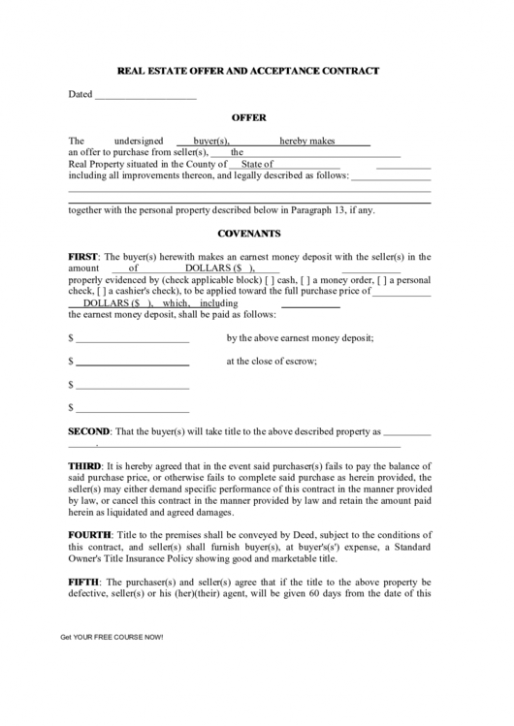Offer And Acceptance Contract Template Taxpayers experiencing tax obligation financial debt problems hardly ever compare the IRS offer in concession with the Chapter 13 insolvency. Regularly, the Phase 13 will provide a extra specific treatment for the taxpayer to fix tax obligation debt. This post analyzes the loved one benefits of both the offer in compromise as well as Chapter 13.

An offer in compromise might be one of the most advertised tax remedy. You can not listen to radio or see television without being pounded by advertisements to settle your tax financial obligation. Typically the advertisements proclaim that the IRS has actually announced that compassion in the collection of the tax obligation debt exists for a restricted time. The unfortunate fact is that the kindness statement by the internal revenue service was typically for other issue location, such as tax shelters. The IRS turns down around 85 percent of all deals in concession submitted due to question regarding collectibility. Deals in concession are typically submitted due to the fact that the taxpayer thinks the tax obligation financial debt can not be paid, Uncertainty as to Collectibility is the most common type of deal in concession. Other sorts of deals in concession are outside the extent of this write-up.
The benefit of the offer in compromise is that the tax obligation liabilities, including the relevant penalties and also interest, are reduced to the quantity the IRS and the taxpayer concur can be paid. Both parties should agree to the terms of the offer in concession. The deal in concession is a agreement in between the internal revenue service as well as the taxpayer. The terms of the contract can be implemented versus the taxpayer along with the internal revenue service.

Acceptance of the deal in concession occurs when the internal revenue service thinks that the offer goes to least as high as could be accumulated by the internal revenue service over the ten years life of the statute of restrictions. The IRS will certainly decline an offer that is for a lower quantity than it can or else gather.
The internal revenue service uses a consistent collection of monetary criteria that are not adaptable in both the analysis of the quantity paid monthly in an installment contract and in an deal in concession. These standards restrict the expenses for living that the taxpayer can declare are required for living. The standards consist of food, real estate as well as energies, transportation, and expense health expense. The standards might create drastic troubles for a taxpayer with a moderately higher standard of living. Business expenses are not impacted by the standards.
The evaluation of the minimal deal in compromise that will certainly make the deal processable is the equity in the taxpayer’s properties plus the quantity that could be paid in an installation agreement over a specific amount of time. The period of the future monthly payments considered by the internal revenue service depends upon exactly how the offer will certainly be paid by the taxpayer. The internal revenue service desires 48 months of monthly settlement if the taxpayer provides a lump sum. The IRS desires 60 months of month-to-month settlement if the offer is to be paid in a short-term agreement of 2 years or much less. Nevertheless, the IRS will take into consideration valid issues such as retirement and also health of the taxpayer in shortening the period of the multiplier.



